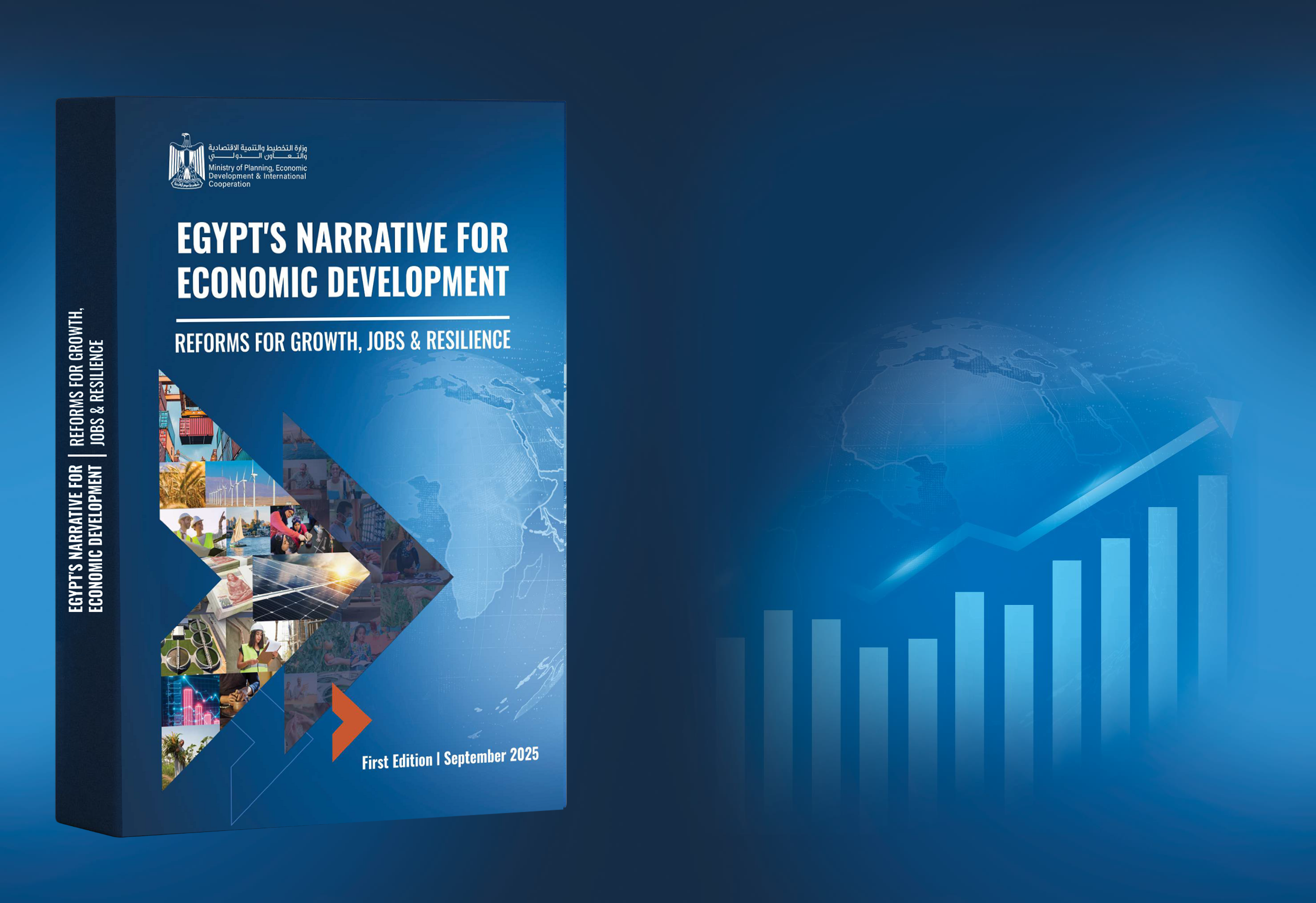English Version of the Executive Summary Made Available on the Ministry's Website in Preparation for the IMF and World Bank Meetings
Al-Mashat Promotes the New Model for the Egyptian Economy and the Government's Efforts to Transition towards Productive Sectors during her Meetings with European Partners
Al-Mashat:
Economic Development: Reforms for Growth, Jobs & Resilience” Goes Beyond Fiscal and Monetary Reform and Focuses on Real Economy Sectors.
Macroeconomic Stability is a Pillar, Alongside Consistent Steps for the Continued Downward Path of Debt and Providing Wider Fiscal Space for Human Development Sectors.
Achieving Integration Between Investment, Industrial, and Trade Policies and Focusing on Sectors with Promising Opportunities to Attract Investments and Increase Exports.
H.E. Dr. Rania Al-Mashat, Minister of Planning, Economic Development and International Cooperation, launched the English version of the Executive Summary of“Egypt’s Narrative for Economic Development: Reforms for Growth, Jobs & Resilience”, during her participation in the Global Gateway Forum, organized by the European Commission in the Belgian capital, Brussels.
The Ministry of Planning, Economic Development and International Cooperation made the English version of the Executive Summary available on the Ministry's website, in preparation for the launch of the International Monetary Fund and World Bank meetings this week.
https://mped.gov.eg/NationalNarrative?lang=en
During her meetings with European Commissioners and bilateral development partners, Dr. Rania Al-Mashat reviewed the axes of“Egypt’s Narrative for Economic Development: Reforms for Growth, Jobs & Resilience”, and promoted the new economic model that the government aims to achieve, which is based on macroeconomic stability, structural transformation towards tradable sectors, redefining the state's role in the economy, and enabling the private sector.
Dr. Al-Mashat confirmed that the Egyptian state has exerted continuous efforts to enhance economic reform and achieve macroeconomic stability since March 2024, and has also implemented projects in the field of infrastructure supporting industrialization and export over the past decade. Therefore, “Egypt’s Narrative for Economic Development: Reforms for Growth, Jobs & Resilience” aims to complete the path of economic reform and utilize the development in basic infrastructure to focus on productive sectors and real economy sectors. Thus, it is considered a new economic reform program that is not limited to the financial axis but includes real economy sectors and a timeline for implementing structural reforms.
Minister Al-Mashat added that we have already begun to witness the transformation in the Egyptian economy, which was reflected in the growth structure during the last fiscal year 2024/2025, evident in non-petroleum manufacturing industries achieving exceptional growth to lead the fastest-growing sectors, alongside tourism, communications and information technology, agriculture, and other vital sectors.
Dr. Al-Mashat noted that the state is moving, in this exceptional phase that the Egyptian economy is undergoing, towards redefining its role in economic activity, through the implementation of the State Ownership Policy Document, which is the governing framework that defines the state's role in economic activity. These options are being implemented through multiple, integrated entities: the State-Owned Enterprises Unit, which works to evaluate public companies according to strategic criteria including economic feasibility, market suitability, and private sector participation opportunities; and the Government Offerings Unit, which works to coordinate efforts to exit from some state-owned assets and companies by enhancing governance and preparing companies to attract Foreign Direct Investments, in addition to the Sovereign Fund.
Minister Al-Mashat pointed out that the axis of macroeconomic stability is a fundamental pillar within the economic reform program that the state is working to implement, by placing public debt on a downward path, while the state simultaneously works to increase the country's resources from tourism and real economy sectors, encourage Foreign Direct Investments, and maximize the benefit from concessional financing and debt swaps, which contributes to extending debt maturities. This is parallel to adopting a proactive public debt management approach, by reducing the debt-to-GDP ratio, improving the maturity structure, and diversifying financing instruments and markets.
At the same time, Dr. Al-Mashat highlighted that the government is already implementing integrated strategies to increase the available fiscal space for human development sectors in general, especially health and education. A main goal of the government's objectives for debt restructuring, increasing its maturity, and setting an annual ceiling for government debt, is to provide additional fiscal space to increase investments in the fields of health, education, and social protection networks.
Dr. Al-Mashat affirmed that “Egypt’s Narrative for Economic Development: Reforms for Growth, Jobs & Resilience” aims to achieve integration between the National Strategy for Foreign Direct Investment, the National Strategy for Industrial Development, the Trade Policy Document, and the Employment Strategy, in order to achieve policy consistency, thereby boosting Egypt's contribution to global value chains and utilizing existing opportunities in promising sectors.
Dr. Al-Mashat mentioned that in parallel with the efforts to transition to sectors with higher productivity, strengthen macroeconomic stability, and govern public investments, the government is working to increase social protection efforts to support the neediest groups. This is achieved whether through implementing structural reforms that expand the social protection network umbrella, or increasing job opportunities for girls and empowering them economically through the National Strategy for Women Empowerment, in addition to expanding the Comprehensive Health Insurance system, which works to improve healthcare services for all citizens, particularly low-income individuals.
